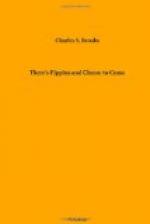In a poorer part of the city still nearer to the East River, where smells of garlic and worse issue from cellarways, I came recently on a considerable park. It was supplied with swings and teeters and drew children on its four fronts. Of a consequence the children of many races played together. I caught a Yiddish answer to an Italian question. I fancy that a child here could go forth at breakfast wholly a Hungarian and come home with a smack of Russian or Armenian added. The general games that merged the smaller groups, aided in the fusion. If this park is not already named—a small chance, for it shows the marks of age—it might properly be called The Park of the Thirty Nations.
Or my inclination may take me to the lower city. Like a poor starveling I wander in the haunts of wealth where the buildings are piled to forty stories, and I spin out the ciphers in my brain in an endeavor to compute the amount that is laid up inside. Also, lest I become discontented with my poverty, I note the strain and worry of the faces that I meet. There is a story of Tolstoi in which a man is whispered by his god that he may possess such land as he can circle in a day. Until that time he had been living on a fertile slope of sun and shadow, with fields ample for his needs. But when the whisper came, at a flash, he pelted off across the hills. He ran all morning, but as the day advanced his sordid ambition broadened and he turned his course into a wider and still wider circle. Here a pleasant valley tempted him and he bent his path to bring it inside his mark. Here a fruitful upland led him off. As the day wore on he ran with a greater fierceness, because he knew he would lose everything if he did not reach his starting place before the sun went down. The sun was coming near the rim of earth when he toiled up the last hill. His feet were cut by stones, his face pinched with agony. He staggered toward the goal and fell across it while as yet there was a glint of light. But his effort burst his heart. Does the analogy hold on these narrow streets? To a few who sit in an inner office, Mammon has made a promise of wealth and domination. These few run breathless to gain a mountain. But what have the gods whispered to the ten thousand who sit in the outer office, that they bend and blink upon their ledgers? Have the gods whispered to them the promise of great wealth? Alas, before them there lies only the dust and heat of a level road, yet they too are broken at the sunset.
Less oppressive are the streets where commerce is more apparent. Here, unless you would be smirched, it is necessary to walk fast and hold your coat-tails in. Packing cases are going down slides. Bales are coming up in hoists. Barrels are rolling out of wagons. Crates are being lifted in. Is the exchange never to stop? Is no warehouse satisfied with what it has? English, which until now you judged a soft concordant language, shows here its range and mastery of epithet. And all about, moving and jostling the boxes, are men with hooks. One might think that in a former day Captain Cuttle had settled here to live and that his numerous progeny had kept the place.




